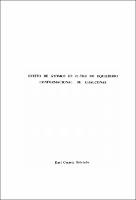Please use this identifier to cite or link to this item:
http://rima110.im.ufrrj.br:8080/jspui/handle/20.500.14407/14720| Tipo do documento: | Dissertação |
| Title: | Efeito de átomos de flúor no equilíbrio conformacional de chalconas |
| Authors: | Cesarin Sobrinho, Darí |
| Orientador(a): | Ferreira, José Carlos Netto |
| Primeiro membro da banca: | Alencastro, Ricardo Bicca de |
| Segundo membro da banca: | Ferreira, Aurélio B. B. |
| Terceiro membro da banca: | Ferreira, José Carlos Netto |
| Quarto membro da banca: | Lima, Áurea EchevarriaAznar Neves |
| Keywords: | Química |
| Área(s) do CNPq: | Química |
| Idioma: | por |
| Issue Date: | 2-Jan-1993 |
| Publisher: | Universidade Federal Rural do Rio de Janeiro |
| Sigla da instituição: | UFRRJ |
| Departamento: | Instituto de Ciências Exatas |
| Programa: | Programa de Pós-Graduação em Engenharia Química |
| Citation: | Cesarin Sobrinho, Darí. Efeito de átomos de flúor no equilíbrio conformacional de chalconas. 1993. 163 f. Dissertação (Mestrado em Engenharia Química) - Instituto de Ciências Exatas, Universidade Federal Rural do Rio de Janeiro, Seropédica-RJ, 1993. |
| Abstract: | Chalcona (1) e seus derivados fluorados 2-4, bem como os análogos cíclicos 5-10, foram sintetizados via reação de condensação, em meio básico, entre as cetonas e os aldeídos correspondentes e, caracterizados por espectrometria de massas, ressonância magnética nuclear de próton e de carbono 13 e por espectroscopia no infra-vermelho. Técnicas modernas de RMN permitiram concluir que 1-4 apresentam configuração trans, enquanto que o equilíbrio conformacional está preferencialmente deslocado no sentido da conformação s-cis, o qual varia como uma função da substituição por átomos de flúor no anel A ou B. Estudos por infra-vermelho indicaram que a percentagem da conformação s-cis em 2-4 é de 57,4 ± 1,4; 88.1 ± 0,4 e 66,4 ± 0,7%, respectivamente, com base no valor calculado por RMN 1H (83%) descrito na literatura para a chalcona (1). Cálculos teóricos (MMX) foram utilizados para justificar as variações para os deslocamentos químicos apresentados por 1- 10 como conseqüência da influência anisotrópica do grupo carbonila nestes compostos. |
| Abstract: | Chalcone (1) and its fluorinated derivatives 2-4 as well as the cyclic analogues 5-10, were synthesized using condensation reaction between the corresponding ketones and aldehydes. These compounds were characterized by mass spectrometry, 1H and 13C nuclear magnetic ressonance and infra-red. Modern NMR techniques allowed us to conclude that 1-4 show a trans configuration, where as their conformational equilibrium is shifted to s-cis conformation. This shift is dependent on the fluorine substitution either on the A or B aromatic ring. Infra-red studies indicated that the field of the s-cis conformation in 2-4 is 57,4 ± 1,4; 88.l ± 0,4 e 66,4 ± 0,7%, respectively, besed on 1H NMR calculations (83%) for chalcone (1) described in the literature. Theoretical calculations, using the MMX method, were employed to justify the variations of the chemical shifts for 1-10 which are consequence of the anisotropic effect showed by the carbonyl group on these compounds. |
| URI: | https://rima.ufrrj.br/jspui/handle/20.500.14407/14720 |
| Appears in Collections: | Mestrado em Química |
Se for cadastrado no RIMA, poderá receber informações por email.
Se ainda não tem uma conta, cadastre-se aqui!
Files in This Item:
| File | Description | Size | Format | |
|---|---|---|---|---|
| 1993 - Darí Cesarin Sobrinho.pdf | Darí Cesarin Sobrinho | 2.35 MB | Adobe PDF |  View/Open |
Items in DSpace are protected by copyright, with all rights reserved, unless otherwise indicated.

